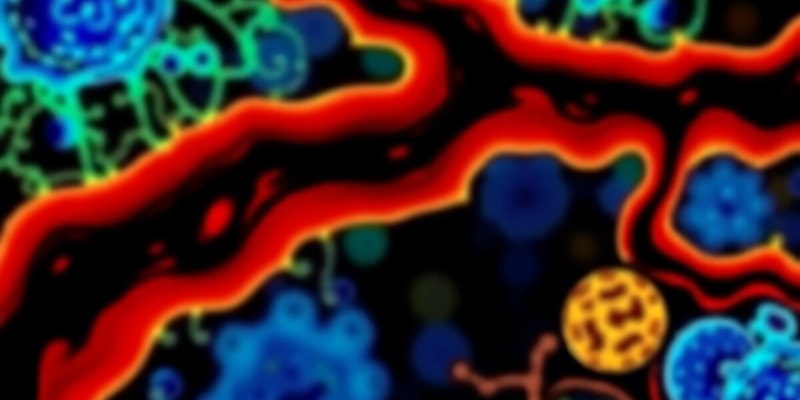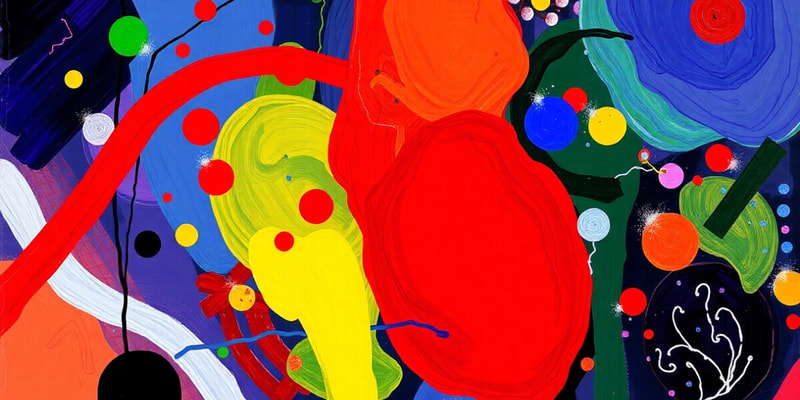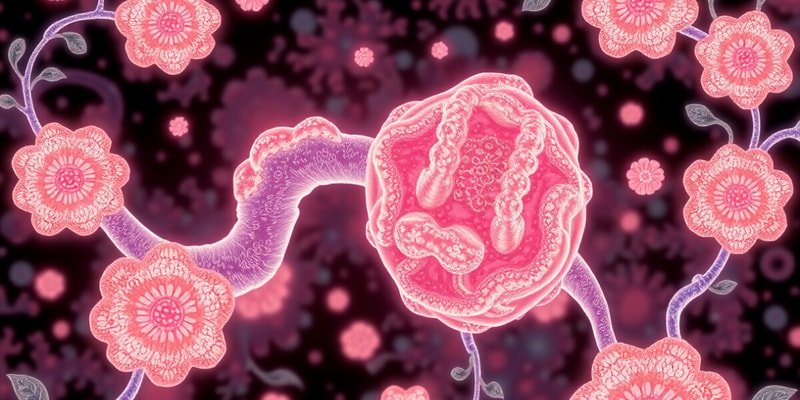Podcast Beta
Questions and Answers
Which type of cells express Class I MHC molecules?
What is the primary cytokine that stimulates Class II MHC expression in antigen-presenting cells?
What aspect of MHC molecules is primarily responsible for their polymorphism?
Which molecule enhances the activation of CD4+ T cells?
Signup and view all the answers
Class II MHC molecules are exclusively expressed on which type of cells?
Signup and view all the answers
What characterizes Class I MHC molecules compared to Class II?
Signup and view all the answers
Which of the following best describes the structural components of Class II MHC molecules?
Signup and view all the answers
Which cytokines have a similar effect on Class I MHC molecules?
Signup and view all the answers
What is the primary role of MHC molecules in the immune response?
Signup and view all the answers
Which class of MHC molecules is found on all nucleated cells?
Signup and view all the answers
How do variations in MHC molecules affect T cell recognition?
Signup and view all the answers
What type of cells primarily expresses MHC class II molecules?
Signup and view all the answers
Which of the following is considered the most effective APC for initiating T cell responses?
Signup and view all the answers
What is the significance of T cell maturation in relation to MHC molecules?
Signup and view all the answers
What is the main function of antigen presenting cells (APC)?
Signup and view all the answers
In the context of T lymphocytes activation, how is peptide-MHC complex recognition crucial?
Signup and view all the answers
What are co-stimulators in the context of T cell activation?
Signup and view all the answers
How do dendritic cells (DCs) capture antigens from the bloodstream?
Signup and view all the answers
What triggers the activation of dendritic cells, turning them into mature DCs?
Signup and view all the answers
What is the function of adjuvants in the immune response?
Signup and view all the answers
Which receptors do resting tissue-resident dendritic cells primarily use to capture antigens?
Signup and view all the answers
What chemokine receptor do mature dendritic cells express after activation?
Signup and view all the answers
What role do proteasomes play in the processing of cytosolic proteins?
Signup and view all the answers
Which cell type is primarily responsible for presenting antigens to CD4+ helper T cells?
Signup and view all the answers
What is the role of pinocytosis in dendritic cells?
Signup and view all the answers
Which process is responsible for generating peptides displayed on class II MHC molecules?
Signup and view all the answers
What is the function of the transporter associated with antigen processing (TAP)?
Signup and view all the answers
What type of proteins are primarily degraded by lysosomes for class II MHC presentation?
Signup and view all the answers
Which statement accurately describes the stability of class I MHC molecules?
Signup and view all the answers
How do extracellular bacteria interact with the cytosolic pathway for MHC presentation?
Signup and view all the answers
Which type of proteins are primarily processed by class I MHC molecules?
Signup and view all the answers
What distinguishes the pathways of class I and class II MHC molecules in antigen processing?
Signup and view all the answers
What is the primary role of the invariant chain (Ii) in the biosynthesis of Class II MHC molecules?
Signup and view all the answers
Which molecule is responsible for editing the peptide repertoire presented by Class II MHC molecules?
Signup and view all the answers
Where do Class II MHC complexes present foreign antigens for recognition?
Signup and view all the answers
What characterizes immunodominant peptides in relation to MHC molecules?
Signup and view all the answers
What is the initial location of Class II MHC molecule synthesis?
Signup and view all the answers
Which type of T cell is primarily recognized by Class II MHC molecules?
Signup and view all the answers
What happens to the invariant chain (Ii) during the processing of Class II MHC molecules?
Signup and view all the answers
How do dendritic cells present antigens from intracellular microbes?
Signup and view all the answers
Study Notes
Introduction
- MHC molecules are responsible for presenting peptides to CD4+ and CD8+ T cells
- Variation in MHC molecules influences both peptide binding and T cell recognition
MHC I and MHC II
- MHC I is present on all nucleated cells and presents peptides to CD8+ T cells
- MHC II is present on dendritic cells, macrophages and B cells and presents peptides to CD4+ T cells
Antigen Presenting Cells (APCs)
- APCs are specialized cells responsible for displaying antigens to lymphocytes
- Dendritic Cells (DCs) are the most effective APCs for activating naïve T cells
- Macrophages and B cells are better for activating previously activated helper T cells
- APCs express class II MHC molecules and co-stimulators that signal T cell activation
Co-stimulators and Adjuvants
- Co-stimulators are APC molecules that are required to fully activate T cells in addition to antigen presentation
- Adjuvants are microbial products that enhance APC co-stimulator expression and improve antigen presentation
Dendritic Cell Role in Antigen Capture and Presentation
- DCs are located in epithelial tissues and capture antigens entering the body
- DCs use receptors like C-type lectins to capture microbes and process them for binding to MHC molecules
- Once activated, DCs express chemokine receptor CCL7 and migrate to the lymph nodes where they stimulate T cells
MHC Molecule Expression
- Class I molecules are expressed on all nucleated cells and present antigens from viruses and tumors
- Class I expression is increased by IFN- alpha and Beta
- Class II molecules are expressed on APCs and are regulated by cytokines like IFN-gamma
MHC Pathway of Antigen Processing and Presentation
- Class I MHC pathway processes internal proteins primarily derived from viruses and other intracellular pathogens via proteasomes
- Peptides generated by proteasomes are transported into the ER by the TAP transporter and bind to MHC I molecules
- Class II MHC pathway processes externally derived proteins that have been endocytosed and degraded via lysosomes
- Degraded peptides bind to MHC II molecules within endosomal vesicles
Immunodominance of Peptides
- Protein antigens are processed to generate multiple peptides, but only some are immunodominant
- Immunodominant peptides are the ones that bind best to the available MHC molecules and are recognized by T cells
Studying That Suits You
Use AI to generate personalized quizzes and flashcards to suit your learning preferences.
Related Documents
Description
This quiz covers the critical roles of MHC molecules in presenting peptides to T cells, as well as detailing the functions of antigen presenting cells (APCs) such as dendritic cells, macrophages, and B cells. Learn about the relationship between co-stimulators and adjuvants in T cell activation. Test your knowledge on these essential immunological concepts.




